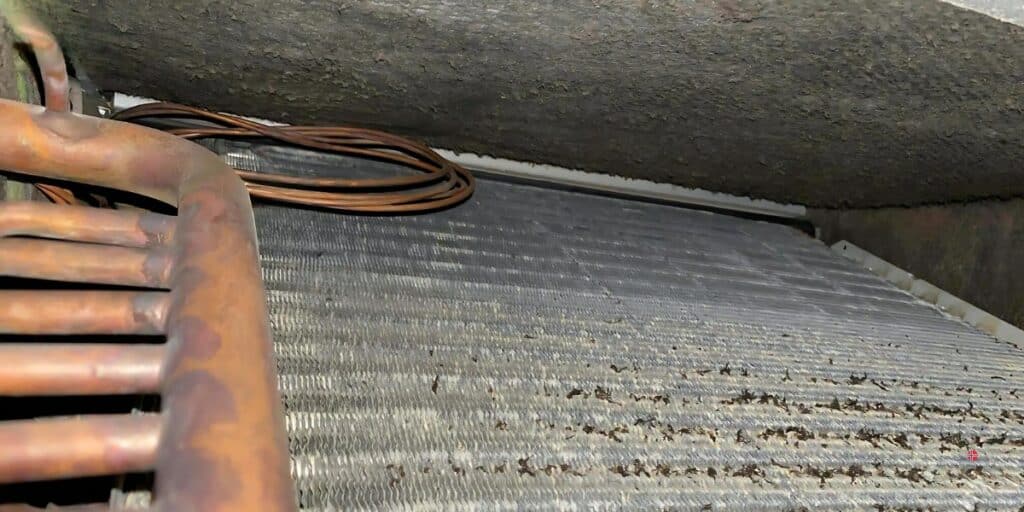Maintaining your home’s air conditioning system is crucial for optimal performance. Dust and dirt in your A/C system can drastically reduce airflow and electrical efficiency, hindering overall performance. This issue is particularly dominant in areas where high winds can stir up significant amounts of dust that easily infiltrate air conditioning systems. Through leaks in ductwork, around air filters, and even through grilles and vents, dust finds its way into your system, causing it to work harder to maintain the desired cooling levels.
Let’s explore how excess dust can impact various components of your air conditioning system and what you can do to mitigate these effects.
Impact on the Air-Handling Unit
The air-handling unit inside your home is a critical component of your air conditioning system. This unit, which circulates cooled air throughout your home, can suffer significantly from dust buildup. While changing your air filter regularly helps prevent dust from entering the system, some particles inevitably get past the filter. These particles can settle on the evaporator coils, which are responsible for absorbing heat from the air.

When the evaporator coils become coated with dust, their ability to absorb heat diminishes. This reduction in efficiency means your air conditioner must work harder to cool your home, leading to increased energy consumption and higher utility bills. Additionally, dirty coils can cause the system to freeze, leading to further inefficiencies and potential damage. Regular maintenance and cleaning of the air-handling unit are essential to ensure it operates at peak efficiency.
Moreover, dust buildup in the air-handling unit can exacerbate indoor air quality issues. As the unit circulates air, it can also distribute dust and other allergens throughout your home. This can be particularly problematic for individuals with allergies or respiratory conditions. Ensuring that your air-handling unit is clean not only improves system efficiency but also contributes to a healthier indoor environment.
Effects on the Condenser Unit
The condenser unit, located outside your home, is another vital part of your air conditioning system. This unit expels the heat absorbed by the evaporator coils, releasing it into the outside air. However, when dust and dirt accumulate on the condenser coils, the heat transfer process is impeded. The system becomes less efficient at expelling heat, which forces the air conditioner to work harder to cool your home.
Over time, this increased workload can lead to higher energy bills and a reduced lifespan for your air conditioning system. The condenser unit’s efficiency is crucial for maintaining the overall performance of your air conditioning system. A dirty condenser unit not only affects cooling efficiency but can also lead to overheating and potential system failure.
Regular cleaning of the condenser unit is essential to prevent these issues. Clearing away debris, such as leaves and grass clippings, and washing the coils can help maintain optimal performance. Professional HVAC technicians can perform a thorough cleaning and inspection, ensuring that your condenser unit is free from dust and operating efficiently.
Risks to the Electrical Control Box
The electrical control box is an integral part of your air conditioning system, particularly for the condenser unit. This box houses various electrical components that control the operation of your air conditioner. Dust and dirt can infiltrate the control box, posing significant risks to the system’s performance.
When dust accumulates in the electrical control box, it can cause electrical shorts, which may lead to system failures. Even before a complete shutdown occurs, dust can hinder the flow of electrical current, reducing the efficiency and performance of your air conditioning system. The potential for electrical issues underscores the importance of keeping the control box clean and well-maintained.
Regular maintenance by a professional HVAC technician includes inspecting and cleaning the electrical control box. This preventive measure helps ensure that your air conditioning system remains operational and efficient. Addressing dust buildup in the control box can prevent costly repairs and extend the life of your system.
Preventing Dust Buildup
Preventing dust buildup in your air conditioning system requires a proactive approach to maintenance. Regular servicing and cleaning by professional technicians are essential to keep your system running efficiently.
Here are some steps you can take to prevent dust accumulation:
- Change Air Filters Regularly: One of the simplest and most effective ways to prevent dust buildup is to change your air filters regularly. Depending on your system and the level of dust in your environment, this may need to be done every one to three months. Clean filters trap dust before it can enter the system, protecting the evaporator coils and other components.
- Seal Ductwork Leaks: Leaky ductwork can allow dust to enter your air conditioning system. Having your ductwork inspected and sealed by a professional can help prevent dust infiltration and improve system efficiency. This step not only reduces dust buildup but also enhances overall air quality.
- Clean Around the Outdoor Unit: The area around your condenser unit should be kept clean and free from debris. Regularly clear away leaves, grass clippings, and other debris that can accumulate around the unit. This helps maintain proper airflow and prevents dust from entering the system.
- Schedule Annual Maintenance: Annual maintenance by a professional HVAC technician is crucial for preventing dust buildup and ensuring your system operates at peak efficiency. Technicians can perform a thorough cleaning of all components, including the air-handling unit, condenser unit, and electrical control box.
While some maintenance tasks, such as changing air filters and clearing debris around the outdoor unit, can be performed by homeowners, professional maintenance is essential for thorough cleaning and inspection. HVAC technicians have the tools and expertise to clean hard-to-reach areas and identify potential issues before they become major problems.
During a professional maintenance visit, technicians will inspect and clean the evaporator coils, condenser coils, and electrical components. They will also check for any signs of wear and tear, ensuring that your system is in good working order. Regular professional maintenance can extend the life of your air conditioning system, improve efficiency, and prevent costly repairs.
Benefits of a Clean Air Conditioning System
Dust buildup in your air conditioning system directly impacts its energy efficiency. When components such as the evaporator coils and condenser coils are coated with dust, the system must work harder to achieve the desired cooling levels. This increased workload leads to higher energy consumption and elevated utility bills.
By keeping your air conditioning system clean and well-maintained, you can improve its energy efficiency. A clean system operates more efficiently, requiring less energy to cool your home. This not only reduces your energy bills but also minimizes your environmental footprint. Investing in regular maintenance is a smart choice for both your wallet and the planet.
In addition to improving efficiency and performance, maintaining a clean air conditioning system has significant health benefits. Dust and allergens that accumulate in your system can be circulated throughout your home, contributing to poor indoor air quality. This can exacerbate allergies, asthma, and other respiratory conditions.
By keeping your air conditioning system clean, you can improve the air quality in your home. Regular maintenance and cleaning help remove dust, allergens, and other contaminants from the system, ensuring that the air you breathe is clean and healthy. This is particularly important for households with individuals who have respiratory issues or allergies.
Excess dust in your air conditioning system can lead to a range of problems, from reduced efficiency and higher energy bills to potential system failures and health issues. Regular maintenance and cleaning are essential to keep your system running smoothly and efficiently. By changing air filters, sealing ductwork leaks, cleaning around the outdoor unit, and scheduling annual professional maintenance, you can prevent dust buildup and ensure optimal performance.
Investing in the maintenance of your air conditioning system not only improves its efficiency and extends its lifespan but also contributes to better indoor air quality and overall comfort in your home. Don’t let excess dust compromise your air conditioning system. Take proactive steps to keep it clean and well-maintained, and enjoy the benefits of a cool, efficient, and healthy home.






